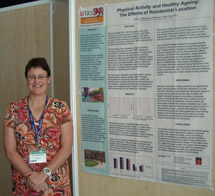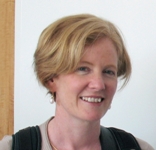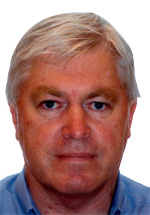Undertaking a graduate research course presents different challenges to different people.
Sharon Hetherington

Sharon was a full time PhD candidate with the CRH and the recipient of an Australian Postgraduate Award to support her studies. Prior to commencing her undergraduate degree (Bachelor of Human Movement) Sharon worked in the electronics and computing industries.
Sharon's topic for her PhD is how social support encourages older people (over 65) to take up and maintain healthy levels of physical activity. The promotion of healthy ageing is important because research shows that regular physical activity prolongs functional independence by maintaining muscle strength and cardiovascular capacity. This in turn can lead to reductions in health care costs associated with chronic disease states and fall injuries.
Sharon's PhD dissertation builds on work she did during her undergraduate studies, particularly her honours study where she investigated the effects of regular Tai Chi practice on the strength and balance of previously sedentary older people. Incidental findings from her honours study showed that the people attending the Tai Chi classes were enjoying the social contact as well as the opportunity to be active. Sharon's aim in her PhD was to capture and describe subjective elements that influence older peoples' activity choices; elements such as engagement, enjoyment, competitiveness and quality of social interaction. Understanding how these elements work together will help to optimise the design of activities for older people and maximise the likelihood of engaging this age group in healthy levels of physical activity.
Dr Christine Stirling

Dr Christine Stirling, who successfully completed her PhD in 2007.
Having now completed my thesis I can look back at the time I spent working on it and say that I thoroughly enjoyed it, particularly when I moved from part to full-time study. The luxury of being able to read and absorb large volumes of literature on methodology and sociological theory was a luxury. While in some ways, completing a thesis is a team effort, where supervisors, peers, friends and family play important support roles, it is also a solitary enterprise. Completion requires that you draw on your own creativity, thinking and writing skills, and continue to believe in your own ability and the worthiness of your project during inevitable times of doubt. Now I have completed I feel grateful for the supporters, proud of my work, and ready to move on to a new phase of research that builds on all the skills and thinking that I developed during my candidature.
Martin Harris

Martin Harris is a research fellow with the CRH and has been part of the Community Engagement team since 1999. He was recently awarded an Australian Postgraduate Award to support his research. His supervisors are Professor Judi Walker and Dr Marion Myhill.
Before taking up his position at the CRH Martin travelled widely, and also worked for many years in independent schools, holding senior teaching and pastoral care posts. Besides his academic writing, Martin enjoys writing for recreation, and has had a number of short stories published.
Martin's PhD examines the personal characteristics of resilience in young males that are sustaining and protective in the absence of familiar contextual supports. The aim of this research is to explore and contribute to the understanding of the mental health implications of geographic dislocation, the mechanisms of personal resilience, and the pathways for intervention. In many ways the understanding of resilience has been retarded by a lack of agreement as to its characteristics. The earlier literature suggested groups of risk factors that might make someone more or less vulnerable to stressors. Later work suggested constellations of protective factors that might buffer against stressors. More recently, research has been focused on the personal mechanisms that operate in the face of adversity.
Martin's research looks more closely at the salutogenic aspects of personal wellbeing, i.e. those factors that allow individuals to thrive.
I have focused on geographic dislocation, so identifying a major stressor that consequentially excludes the familiar support aspects normally associated with resilience.
The cohort used to explore the experience in this study is the AFL draft and particularly those players who are relocated to take up their contracts. For the young rural men moving from 'one world to another', this study will provide a rich source of information and directions for appropriate preparations that will assist them to thrive in their new environment.
I hope that for the clubs involved this research will provide a better understanding of the particular needs of young recruits, improved understanding of the psychosocial needs of players and an opportunity to develop strategic plans to support player welfare.